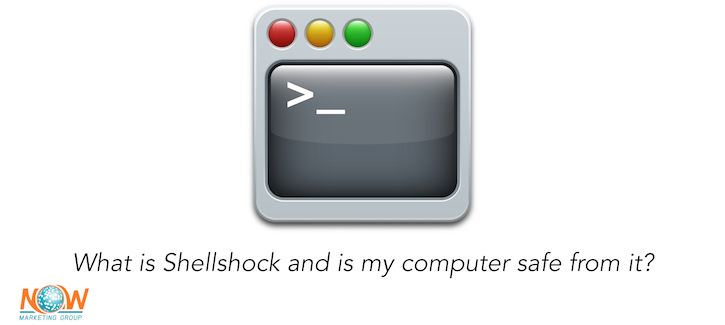By now, you’ve probably heard about Shellshock, and may be wondering if your computer is vulnerable. I’m here to set your mind at ease -- and I promise, I won’t be overly technical.
So what is Shellshock exactly?
Shellshock is the nickname for a weakness discovered in “BASH” -- the software acting as an interpreter between your computer and the command-line (think MS-DOS). Contrary to popular belief the command-line still exists, silently running in the background of most computers.
Shellshock affects servers primarily, and is not a virus but rather a vulnerability in system services.
What does it do?
Shellshock allows a remote hacker to issue command-line instructions to a computer, potentially compromising it for nefarious purposes. While assumed to be a recent discovery, Shellshock has existed for over 20 years.
Does it affect my smartphone?
In short, no. If you’re running the latest version of Android or iOS, you’re safe. However, if you’re an advanced user who likes to tinker with core system files (also known as “jailbreaking” or “rooting”), be careful.
Does it affect Windows?
Unless you have a very specific setup, it is extremely unlikely to affect computers running Microsoft Windows. Yes it’s possible, but you would need to have a relatively obscure piece of software running to create a Shellshock vulnerability.
I’m a Mac user, am I safe?
It depends. Shellshock affects systems running Unix and its variations iterations, including Mac OSX and Linux. Apple has already released a patch; Per software release notes, only advanced set ups were even vulnerable to begin with.
So what’s the big deal?
Fair question. Again, this affects servers more than anything else. The concern is how confidential information could be obtained from your computer once it’s connected to a compromised server.
How can I protect myself? Should I update my virus software?
Remember this is not a virus: updating your protection software doesn’t factor in. And if you connect to the internet via a typical consumer grade router (think Linksys or Netgear routers from Walmart), you don’t have a whole lot to worry about.
For larger system networks, most IT managers have already heard about and are already taking steps to patch their servers.
Generally speaking, your computer should be safe. They key thing to remember: use caution. If your computer does anything suspicious, such as your DVD drive randomly opening -- notify your system administrator immediately.




Comments